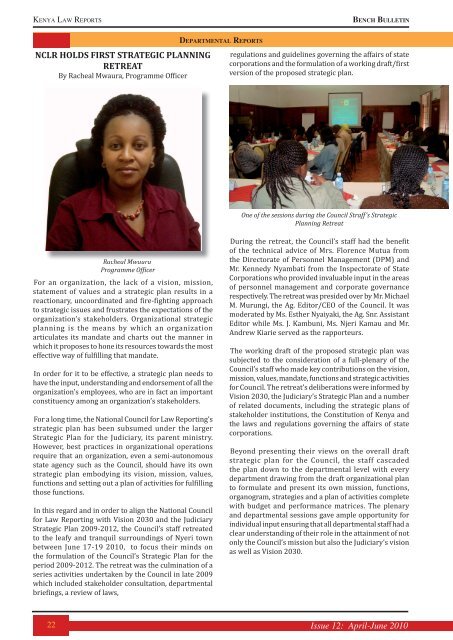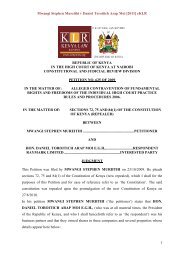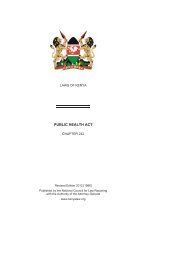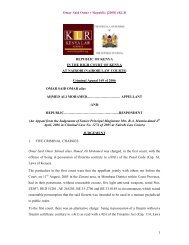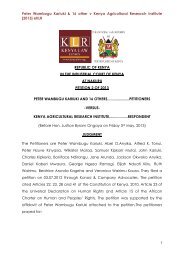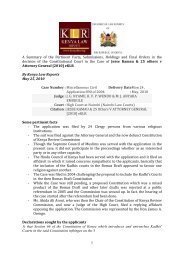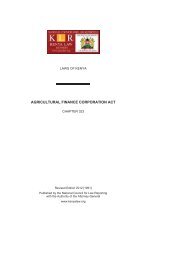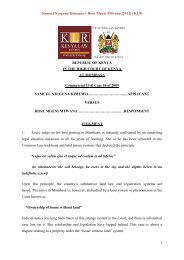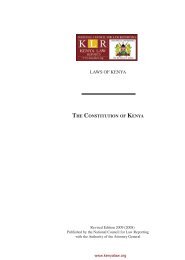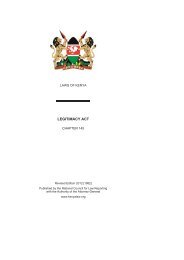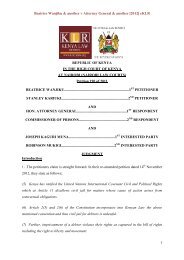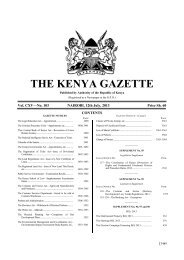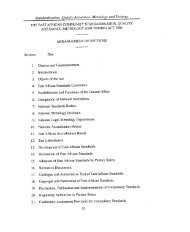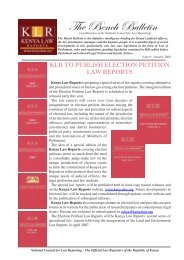Bench Bulletin - Issue 12 - Kenya Law Reports
Bench Bulletin - Issue 12 - Kenya Law Reports
Bench Bulletin - Issue 12 - Kenya Law Reports
Create successful ePaper yourself
Turn your PDF publications into a flip-book with our unique Google optimized e-Paper software.
KENYA LAW REPORTS<br />
BENCH BULLETIN<br />
NCLR HOLDS FIRST STRATEGIC PLANNING<br />
RETREAT<br />
By Racheal Mwaura, Programme Officer<br />
DEPARTMENTAL REPORTS<br />
regulations and guidelines governing the affairs of state<br />
corporations and the formulation of a working draft/first<br />
version of the proposed strategic plan.<br />
One of the sessions during the Council Straff’s Strategic<br />
Planning Retreat<br />
Racheal Mwaura<br />
Programme Officer<br />
For an organization, the lack of a vision, mission,<br />
statement of values and a strategic plan results in a<br />
reactionary, uncoordinated and fire-fighting approach<br />
to strategic issues and frustrates the expectations of the<br />
organization’s stakeholders. Organizational strategic<br />
planning is the means by which an organization<br />
articulates its mandate and charts out the manner in<br />
which it proposes to hone its resources towards the most<br />
effective way of fulfilling that mandate.<br />
In order for it to be effective, a strategic plan needs to<br />
have the input, understanding and endorsement of all the<br />
organization’s employees, who are in fact an important<br />
constituency among an organization’s stakeholders.<br />
For a long time, the National Council for <strong>Law</strong> Reporting’s<br />
strategic plan has been subsumed under the larger<br />
Strategic Plan for the Judiciary, its parent ministry.<br />
However, best practices in organizational operations<br />
require that an organization, even a semi-autonomous<br />
state agency such as the Council, should have its own<br />
strategic plan embodying its vision, mission, values,<br />
functions and setting out a plan of activities for fulfilling<br />
those functions.<br />
In this regard and in order to align the National Council<br />
for <strong>Law</strong> Reporting with Vision 2030 and the Judiciary<br />
Strategic Plan 2009-20<strong>12</strong>, the Council’s staff retreated<br />
to the leafy and tranquil surroundings of Nyeri town<br />
between June 17-19 2010, to focus their minds on<br />
the formulation of the Council’s Strategic Plan for the<br />
period 2009-20<strong>12</strong>. The retreat was the culmination of a<br />
series activities undertaken by the Council in late 2009<br />
which included stakeholder consultation, departmental<br />
briefings, a review of laws,<br />
During the retreat, the Council’s staff had the benefit<br />
of the technical advice of Mrs. Florence Mutua from<br />
the Directorate of Personnel Management (DPM) and<br />
Mr. Kennedy Nyambati from the Inspectorate of State<br />
Corporations who provided invaluable input in the areas<br />
of personnel management and corporate governance<br />
respectively. The retreat was presided over by Mr. Michael<br />
M. Murungi, the Ag. Editor/CEO of the Council. It was<br />
moderated by Ms. Esther Nyaiyaki, the Ag. Snr. Assistant<br />
Editor while Ms. J. Kambuni, Ms. Njeri Kamau and Mr.<br />
Andrew Kiarie served as the rapporteurs.<br />
The working draft of the proposed strategic plan was<br />
subjected to the consideration of a full-plenary of the<br />
Council’s staff who made key contributions on the vision,<br />
mission, values, mandate, functions and strategic activities<br />
for Council. The retreat’s deliberations were informed by<br />
Vision 2030, the Judiciary’s Strategic Plan and a number<br />
of related documents, including the strategic plans of<br />
stakeholder institutions, the Constitution of <strong>Kenya</strong> and<br />
the laws and regulations governing the affairs of state<br />
corporations.<br />
Beyond presenting their views on the overall draft<br />
strategic plan for the Council, the staff cascaded<br />
the plan down to the departmental level with every<br />
department drawing from the draft organizational plan<br />
to formulate and present its own mission, functions,<br />
organogram, strategies and a plan of activities complete<br />
with budget and performance matrices. The plenary<br />
and departmental sessions gave ample opportunity for<br />
individual input ensuring that all departmental staff had a<br />
clear understanding of their role in the attainment of not<br />
only the Council’s mission but also the Judiciary’s vision<br />
as well as Vision 2030.<br />
22<br />
<strong>Issue</strong> <strong>12</strong>: April-June 2010


